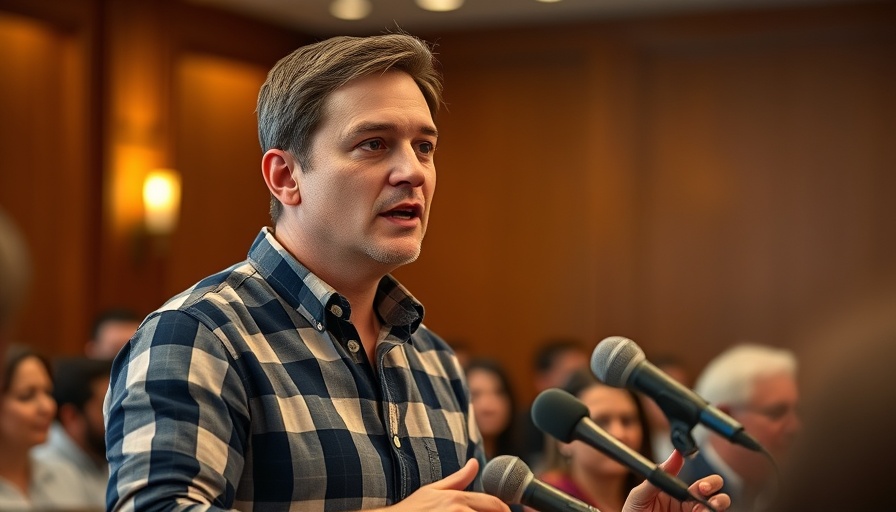
The Future is Here: Navigating the Choke Point of Western Civilization
In an era marked by rapid cultural shifts and societal transformations, historian Tom Holland raises a pressing question: Can society endure without the foundational core of Christianity? The exploration of this question is critical as we observe a world both fracturing and evolving, presenting us with various potential futures that may unfold. As we examine these pathways, we find ourselves at a controversial choke point in history—a moment of decisive significance for the West.
In 'Historian Predicts the Future... And it's Happening', the discussion dives into the crucial intersections of faith and cultural evolution, exploring key insights that sparked deeper analysis on our end.
Understanding Progressive Paddingtonism
One potential trajectory emerging from our current state of affairs is what Holland refers to as “Progressive Paddingtonism.” This term highlights a liberal, almost idyllic perspective where compassion and kindness are priorities. Yet, beneath this surface lies a significant shift: this worldview seeks to detach from its Christian roots. Instead of nurturing a robust understanding of faith, it evolves into a superficial sense of morality that could soon drift from its origins.
The removal of Christianity from the cultural fabric raises vital concerns. With values once deep-seated now repurposed in a secular context, can society sustain its moral compass without the foundational divine narrative? Holland warns that this could pave the way for a culture operating purely on secular principles, launched forward but detached from the substantial meaning behind those values.
The Reaction: Anti-Woke Backlash
As with any significant shift, a counter-movement is also taking form. This burgeoning anti-woke backlash emerges as both a reaction to and a critique of the principles underpinning Progressive Paddingtonism. Where do the anti-woke find refuge? They often look back towards traditional moral frameworks, including a reassertion of Christian ethics, albeit not exclusively. This movement admits a complex relationship with Christianity, acknowledging its contributions to modern thought while retreating toward a more individually-centered moral philosophy.
Inside this tension are echoes of the past, where strength and dominance held sway in society’s moral landscape. The danger lies in the potential normalization of these ideals, opening the door to philosophies rooted less in compassion and more in a disposition to act upon one's desires and power.
A Resurgence of Faith: Christian Renewal
Amidst these tensions, a fascinating possibility arises: the resurgence of Christian faith. If Holland's observations are right, we are witnessing a quiet yet significant revival in interest towards Christianity. People are increasingly exploring their faith, returning to church, and engaging in spiritual practices. The cultural landscape may very well include a resurgence of Christianity that brings forth a new wave of spiritual awakening.
This revival may be marked by a deepening understanding of the core tenets of Christianity, inviting individuals to rediscover their personal relationship with Jesus Christ. The gentle invitation to explore faith through initiatives like the 321 course presents one approach to this revival, enabling an exploration of Christian teachings in an accessible format.
The Rise of Islam: A Complex Layer
Another intricate layer to the contemporary landscape is the growth of Islam. As Western societies become increasingly multicultural, the interactions between various faith traditions will be pivotal. What will the fusion of these religious narratives mean for the future of Western civilization? This question is not only relevant but unavoidable as societies grapple with their identities amidst growing pluralism.
Moreover, the coexistence of divergent belief systems positions each tradition in a complex dialogue, a challenge that invites both tension and opportunity for growth. Navigating this landscape will require understanding and respect among religious communities to cultivate harmony.
Reflection and a Critical Lens
Each of the paths we observe—whether it be Progressive Paddingtonism, the anti-woke backlash, the resurgence of faith, or the growth of Islam—denotes a broader cultural movement. These developments highlight a society at a crossroads, mired in complexities that could signal one of several potential futures.
As we ponder this, it's crucial for believers and non-believers alike to engage in discussions about values, ethics, and the role of faith in shaping our collective identity. Reflection on these paths presents a unique opportunity to re-evaluate societal norms while considering their roots and implications.
A Call to Engage in Dialogue
The question posed by Tom Holland is one that invites all of us to grapple with our beliefs and ideologies. As we navigate through these tumultuous times, one thing is clear: understanding the intersecting influences of religion on culture provides a grounding perspective. Embracing discussion and inquiry not only enriches our own faith but also fosters a more inclusive dialogue among varying beliefs.
This pivotal moment beckons us all—to seek understanding, engage in respectful conversations and explore the deep-seated questions that affect our society's trajectory. If you're interested in digging deeper into the heart of Christianity, consider joining us for the free 321 course. Rediscover what the essence of faith can mean for you today. Simply visit 321course.com to begin.
In these times of uncertainty, one thing remains constant: the values shaped by Christianity—compassion, equality, and progress—remain integral to the narrative of the West. Let’s continue asking ourselves critical questions about our future and our faith.
 Add Row
Add Row  Add
Add 








Write A Comment